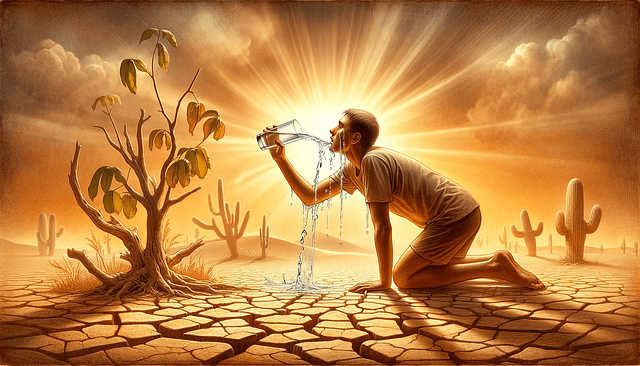7 Shocking Facts: Dehydration & Back Pain, reveals surprising links between hydration and back pain. Stay informed and pain-free.
A prevalent condition that millions of individuals experience globally is back discomfort. Although there are numerous causes of back pain, dehydration is a startling and frequently disregarded one.
Knowing the connection between dehydration and back pain might help you ease discomfort and take preventative action. give reasonable advice on staying hydrated and discuss how dehydration might affect the health of your back.
Introduction Dehydration & Back Pain:
Every biological operation in our body, including the upkeep of our spine’s health, depends on water. When the body loses more fluids than it takes in, dehydration sets in, which can result in several health problems. Back pain is one side effect of dehydration that is frequently disregarded.
Water makes up the majority of the intervertebral discs in our spine, which serve as shock absorbers. These discs become less hydrated when the body is dehydrated, which lessens its capacity to adequately cushion the vertebrae.
Back discomfort may arise from this increased pressure on the spine. Dehydration can also result in muscular spasms and cramps, which can aggravate back pain.
SIGNS OF DEHYDRATION
Keep an eye out for these indicators of dehydration:
Bad Breath
Dark Urine
Fatigue
Headaches
Dry Skin
Muscle Cramps
Dry Eyes/Blurry Vision
Dizziness
Irritability
Fever
7 Shocking Facts: Dehydration & Back Pain
Fact 1: Your spine is cushioned by water
The spinal discs in between each vertebrae act as little cushions to cushion impacts and maintain the flexibility of your spine. The majority of these discs are made of water. These discs lose water when you get dehydrated, which lessens their ability to cushion your spine. This may result in more pressure being placed on the muscles around your spine and cause pain and discomfort.
Tip: Drink Plenty of Water
To keep your spinal discs hydrated, aim to drink at least eight 8-ounce glasses of water a day. If you’re physically active or live in a hot climate, you may need even more.
Fact 2: Muscle cramps are caused by dehydration
For muscles to work properly, they must be properly hydrated. Your muscles are more likely to cramp and spasm when you’re dehydrated, which can aggravate back discomfort.
These cramps can come on quickly, be extremely painful, and frequently cause chronic discomfort as well as problems moving around.
Tip: Maintain Electrolyte Balance
In addition to water, ensure you’re getting enough electrolytes, such as potassium and magnesium, which are essential for muscle function. Consider drinking electrolyte-enriched beverages, especially after intense physical activity.
Fact 3: Inflammation Can Be Caused by Dehydration
Inflammation can result from dehydration in any part of the body, including the back. Pain can be made worse by inflammatory processes that irritate nearby muscles and nerves. Long-term back problems and persistent inflammation can both be exacerbated by chronic dehydration.
Tip: Anti-Inflammatory Diet
Incorporate anti-inflammatory foods like berries, leafy greens, and fatty fish into your diet. These foods can help reduce inflammation and support overall hydration.
Fact 4: Nerve Function Is Affected by Dehydration
For effective signal transmission, your nerves require a wet environment. Nerve function can be impacted by dehydration, which can cause a misunderstanding between the brain and muscles. Back discomfort, tingling, or numbness may come from this.
Tip: Regular Hydration Habits
Make a habit of drinking water regularly throughout the day. Carry a water bottle with you and set reminders if necessary to ensure you stay hydrated.
Fact 5: Dehydration Can Lead to Poor Posture
When dehydrated, the body may struggle to maintain proper muscle function, which can lead to poor posture. Poor posture puts additional strain on the spine and back muscles, often resulting in pain and discomfort.
Tip: Practice Good Posture
Pay attention to your posture, especially if you sit for long periods. Use ergonomic furniture, take breaks to stretch, and stay hydrated to support muscle function and posture.

Fact 6: Chronic Conditions May Get Worse When Dehydrated
Dehydration can exacerbate the symptoms of chronic back disorders like arthritis or ruptured discs. Maintaining adequate water is crucial for controlling these symptoms and averting flare-ups.
Tip: Monitor Your Hydration Status
Keep track of your daily water intake and be aware of the signs of dehydration, such as dark urine, dry mouth, and fatigue. Staying vigilant can help you manage chronic conditions more effectively.
Fact 7: Physical Performance Is Affected by Dehydration
Staying physically active is essential to keeping your back healthy. Dehydration, however, can seriously affect your physical performance, making it more difficult to exercise and maintain an active lifestyle.
This inactivity may cause the muscles in the back to weaken and cause more discomfort.
Tip: Hydrate Before and After Exercise
Drink water before, during, and after your workouts to ensure you stay hydrated. This will help you maintain your performance levels and keep your back muscles strong and healthy.
FAQ
Q1: How much water should I drink to prevent back pain?
A1: Aim to drink at least eight 8-ounce glasses of water a day. However, individual needs may vary based on factors like activity level, climate, and overall health. Listen to your body and adjust your intake accordingly.
Q2: Can dehydration cause chronic back pain?
A2: Yes, chronic dehydration can lead to ongoing inflammation and muscle dysfunction, contributing to chronic back pain. Staying hydrated is crucial for managing and preventing chronic conditions.
Q3: What are the signs of dehydration?
A3: Common signs of dehydration include dark urine, dry mouth, fatigue, dizziness, and muscle cramps. If you experience these symptoms, increase your water intake.
Q4: Are there any beverages that can dehydrate me?
A4: Yes, beverages like alcohol, caffeinated drinks, and sugary sodas can have diuretic effects, leading to dehydration. It’s best to consume these in moderation and balance them with water intake.
Q5: Can hydration alone cure my back pain?
A5: While staying hydrated can significantly improve back health and reduce pain, it may not be a cure-all. It’s important to address other factors such as posture, physical activity, and underlying medical conditions in conjunction with proper hydration.
Q6: Are there specific foods that can help with hydration?
A6: Yes, foods with high water content, such as cucumbers, watermelon, oranges, and strawberries, can help keep you hydrated. Incorporating these into your diet can support your overall hydration levels.
Q7: How quickly can I expect to see improvements in my back pain after increasing my water intake?
A7: Improvements can vary depending on the severity of dehydration and individual health conditions. Some people may notice relief within a few days, while others might take longer. Consistent hydration is key for long-term benefits.
The Bottom Line:
Your back’s health can be significantly impacted by dehydration, which can exacerbate pain and suffering. You may take proactive measures to stay hydrated and maintain a healthy back by being aware of the link between dehydration and back pain.
Always remember to stay hydrated, keep your electrolyte levels in check, eat a diet rich in anti-inflammatory foods, and adopt proper posture. You’ll be in a better position to avoid and treat back discomfort if you do this.
Your back’s health can be significantly improved by including these hydration tips in your everyday routine. You’ll enhance your general health and lessen back discomfort by maintaining adequate hydration.










